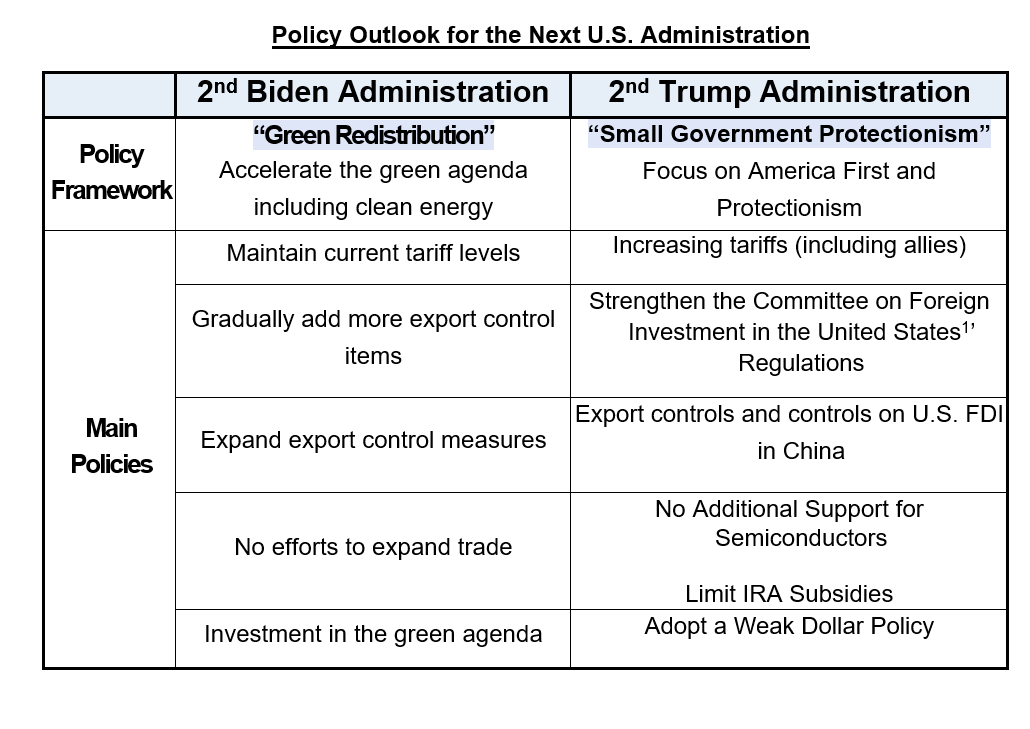News & Events
Press Releases
Advancing Together Seminar: Korea-U.S. Partnerships for Global Technology Leadership
|
Need To Secure Global Competitiveness in Advanced Tech Industries Through Korea-U.S. Cooperation
- FKI hosts seminar with Robert D. Atkinson, president of the Information Technology & Innovation Foundation (ITIF), the leading think tank on technology and innovation policy -
• Synergy effect from Korea-U.S. cooperation is high in advanced tech sectors such as semiconductors
• Policy outlook after U.S. election: higher tariffs (including for allies) (Trump), further trade restrictions (Biden)
• How Korea Should Respond to Next Presidency:
① Publicize its investments and blue collar job creation in the U.S.
② Put in place policies in line with global standards that allow free business activities
• Korea-U.S. Biotech Cooperation: reduce reliance on Chinese pharmaceutical raw materials through joint R&D and promote friendshoring
• Korea-U.S. AI Cooperation: establish a multilateral AI R&D center that brings together partner countries centered around Korea and the U.S.
Amidst the intensifying competition to gain an edge in advanced technology industries, the Federation of Korean Industries (FKI) and the Tech & Trade Institute held a seminar titled “Advancing Together: Korea-U.S. Partnerships for Global Technology Leadership” on June 12 (Wednesday) at the FKI Tower Conference Center in Yeouido to discuss ways to increase synergy between Korea and the United States in AI and biotechnology.
U.S. dominance in advanced tech is good for Korea's advanced tech industry too
Robert D. Atkinson, president of the Information Technology and Innovation Foundation (ITIF), delivered a keynote speech on "How the U.S. Election will Affect Industrial and Technology Policies and Countermeasures for Korea," emphasizing the importance of maintaining close ties between the two countries, as synergistic Korea-U.S. cooperation is crucial for securing global competitiveness in advanced tech industries such as semiconductors.
Atkinson cited semiconductors and quantum computing as areas of mutual benefit for Korea and the U.S., and smart cities, robotics, nuclear energy, shipbuilding, and smart manufacturing as other promising areas for bilateral technology cooperation.
Atkinson characterized a potential second-term Trump administration as "Small Government Protectionism" centered on defending national interests and predicts that Trump’s foreign policy will likely include: increasing tariffs without exception, even for allies; a weak dollar policy; increased scrutiny of foreign investment in the U.S., including M&As (to prevent technology leakage); export controls and controls on U.S. FDI in China; no additional support for semiconductors; and restrictions on IRA subsidies.
He said that in preparation for the outcome of the U.S. presidential election, Korea should actively promote its investments in the U.S. (e.g. establishing factories in the U.S. and creating blue-collar jobs) and put in place policies in line with global standards that allow free business activities.

1 *An organization that reviews foreign investments in the United States and has the authority to suspend investments based on national security threats.
Korea-U.S. cooperation to reduce dependence on China for pharmaceutical raw materials and friendshoring needed
Stephen Ezell, vice president of ITIF, gave a presentation during the session on "Korea-U.S. Bioscience Cooperation" and pointed out that Korea has high potential in the bioscience industry but has not yet achieved tangible results. He suggested that Korea and the US work together to create joint outcomes, such as reducing dependence on Chinese pharmaceutical raw materials.
Korea has the fourth largest number of preclinical drugs in development as of 2022, after the United States, China, and the United Kingdom, and ranks third in the world in terms of the most cited biotechnology papers worldwide 2 over the past decade, behind China and the United States. However, according to the Hamilton Index 3 developed by ITIF, Korea’s pharmaceutical sector is expected to be the worst-performing sector among the 10 strategically important industries in 2023.
Ezell emphasized the need to expand various joint R&D initiatives between Korea and the U.S. and suggested that they jointly develop pharmaceutical raw materials to reduce dependence 4 on China and India, which dominate the market and expand friendshoring 5 .
2 *Percentage of the top 10% of the world's most cited biotechnology papers from 2012 to 2022.
3 *Measures the value added by each country in a given year. to ten strategically important industries: computers and electronics, electrical equipment, machinery and equipment, motor vehicles, other transportation, chemicals, basic metals, fabricated metals, IT and information services, pharmaceuticals.
4 *85% of raw materials for FDA-approved generic drugs are from China and India (2021).
US and EU share: 64% (2000) → 11% (2021)
5 *Securing major raw materials such as minerals, energy, and foodstuffs from friendly countries and building supply chains together.
Establish an AI R&D cooperation organization with friendly countries
Chi-Ung Song, a senior research fellow at the Science and Technology Policy Institute, who gave the presentation during the session on "Korea-U.S. AI Cooperation," emphasized that both countries are at the forefront of global AI research, with the U.S. leading the world in the number of AI research publications in 2022 (1,811) and Korea second (890), and the U.S. leading the world in the number of cumulative AI patents from 2015 to 2022 (9,292) and Korea second (7,380).
This is because Africa is a geographically remote and unfamiliar market to Korea, and Korea's perception of Africa has been limited to resource development and infrastructure, or ODA (official development assistance).
He suggested that Korea and the U.S. should take the lead in global AI R&D and proposed the establishment of a Multilateral AI Research Institute (MAIRI) under the leadership of the two countries, bringing together friendly nations with shared values.